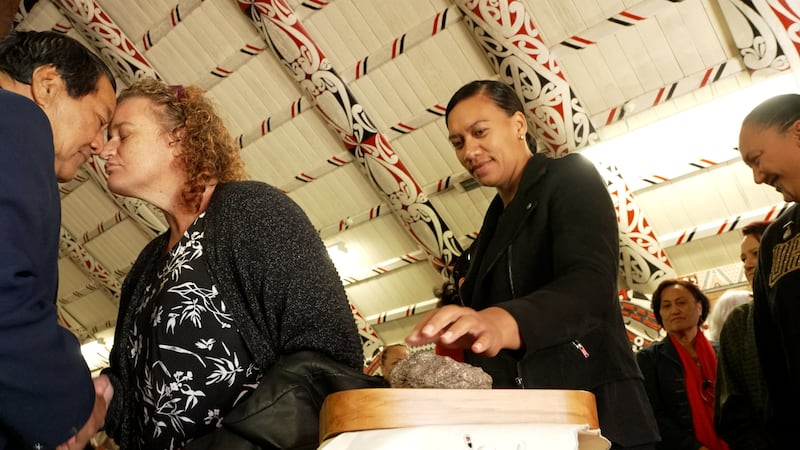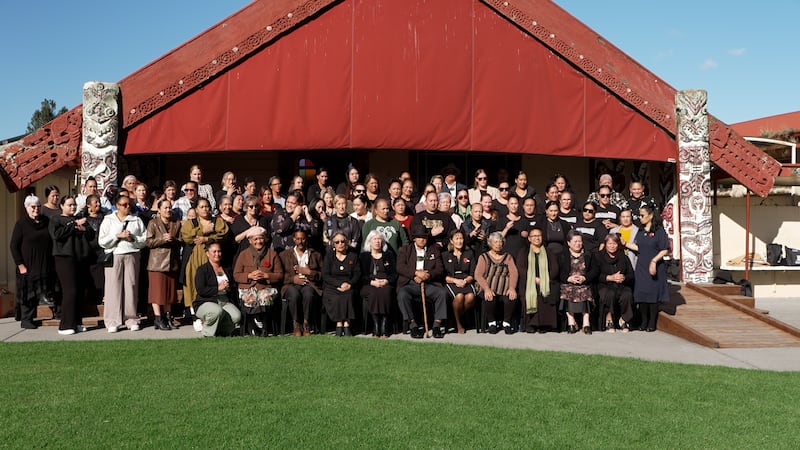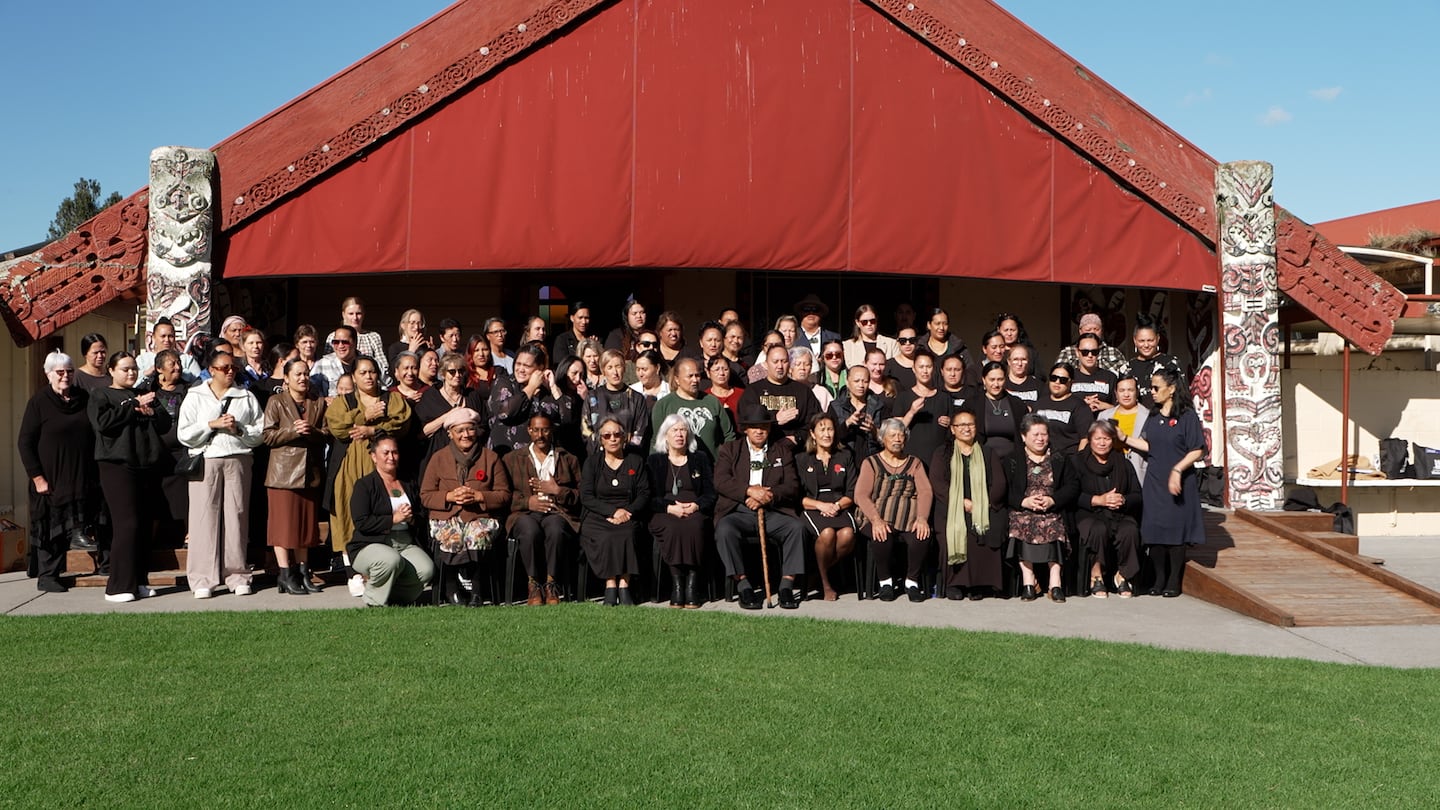Neke atu i te 300 ngā nēhi Māori e hui ana ki Kōkōhīnau Marae, i Te Teko, arā, ki ‘Te Waka Tūhono ki Tua’, te tuatahi o ngā wānanga whakakotahi i ngā peka o Te Ōhanga Mataora Paetahi (Mahi Nēhi) e whakahaerehia ana e Te Whare Wānanga o Awanuiārangi i ngā tōpito o te motu.
He kaupapa e whakahaerehia ana e Te Kaunihera o Ngā Nēhi Māori o Aotearoa, e te ratonga hauora Māori, arā, Te Puna Ora o Mataatua, rātou tahi ko Te Whare Wānanga o Awanuiārangi.
Kōriporipo ana ngā kare ā roto o Pareake O’Brien-Rogers, kaiārahi i Te Kaunihera o Ngā Nēhi Māori ki Te Waiariki, mō tēnei hui.
Kei te manawarū a ia i te nui kua tae ki te wānanga tuatahi nei, heoi, kei te manawapā hoki mō ngā mahi nēhi ki tua, matua rā mō ngāi Māori i raro i ngā panonitanga wāwāhi tahā a te kāwanatanga haumi hōu nei ki te rāngai hauora.
“Kei te āhua mataku kē ahau mō ō mātou nēhi Māori i ngā rā kei te haere mai. Koinā te mea, me haere mai tātou ki ngā wānanga pēnei hei whakapiki ake i ō mātou hinengaro, ngā wairua, hei kōrero tahi tātou. Me haere ai tātou i roto i ngā mahi mō [ngā] nēhi Māori, hei whakapai ai i ō mātou whānau,” hei tāna.

Ko te aronga Pākehā e whakatuanui tonu ana
E rua rā te roa o tēnei wānanga mā ngā nēhi kua rēhitatia, mā ngā nēhi e mahi ana, otirā mā ngā kaiāwhina, mā ngā tauira nēhi, mā ērā hoki e aro ana ki tēnei mahi.
Ko ngā ākonga tau 1, 2, 3 hoki o Te Ōhanga Mataora Paetahi (Mahi Nēhi) a Te Whare Wānanga o Awanuiārangi e whai wāhi atu ana, me ngā ākonga o-mua o te hōtaka e mahi ana i te rāngai hauora.
Ko Trinaka Godsmark-Cawa nō Whakatāne, he ākonga tau tuatahi i Te Ōhanga Mataora Paetahi, i tahuri ai tōna aro ki ngā mahi nēhi nā tana hiahia “whakahoki koha” atu ki tana hapori.
E pai ana ki a ia te tūtaki atu ki ngā ākonga hōu nō ngā moka katoa o te motu, te whakarongo hoki ki ngā kaikōrero matua, heoi mō te taha ki ngā panonitanga e mahia ana i te rāngai e aro atu nei ia, kei te māharahara.
“It is very concerning for me being a student and also seeing my mum study and become a nurse and just seeing all of the shortages, mainly of all of the resources,” hei tāna.
Ko Waiharakeke Biddle nō Ngāi Tūhoe, Tainui, he ākonga o-mua o Te Ōhanga Mataora, e mahi ana, e arataki ana i tētahi kapa i te rāngai oranga hinengaro, ā, hei tāna he uaua ki a ia ki te mahi i roto i tētahi kaupapa hauora pākeha mā ngā tāngata whai ora.
“We are still being confronted by Pākehā ways of doing. For example, you would have to read up on a tangata whai ora, you must get consent for that first and there is no time for that, there is no time for whakawhānaungatanga . It’s really ‘Okay, what did you come in for, okay blood pressure, haere rā’,” te kōrero a Biddle.
Nā te tokoiti, ka ruhi
18 marama noa iho te roa o Te Aka Whai Ora e tū ana, ka whakakorea. Ko ngā kaimahi ka whakawhitihia atu ki Te Whatu Ora - Health New Zealand, ā, ko Te Aka Whai Ora ka oti atu hei muri i te 30 o Hune.
Mai anō ngā mātanga e mea ana, ko Te Aka Whai Ora, he puāwaiatanga o ngā tohe a ngā kaiārahi Māori i ngā tau huhua, me pēhea te pūnaha hauora i Aotearoa e whakahōungia ai, e pai ake ai ngā ratonga ki te Māori, e mana ai Te Tiriti o Waitangi anō hoki.
Ko Te Whatu Ora e mea ana, e 4800 ngā nēhi e hiahiatia ana i te rāngai, ahakoa he tata te ki te 23% te pikinga ake o te nui o ngā nēhi kua whiwhi mahi i raro i Te Whatu Ora i ngā tau e rima kua hori. Ko te ruhi te take matua e wehe ana te nuinga i te mahi nēhi.
Ahakoa te huringa o te pūnaha hauora o Aotearoa me te tokoiti o ngā nēhi, te take e ruhi nei ngā nēhi ka wehe i te mahi nei, e whakapono ana a O’Brien-Rogers, mā ngā kaupapa pēnei i Te Waka Tūhono ki Tua me te aronga ki te “tūhono tangata, tūhono tīkanga, tūhono hauora,” kia noho tōpū ai ngā kaimahi ki raro i te maru o ngā tikanga Māori tuku iho, ka pai ake ai te hauora me te oranga o te tangata - ‘koia pū e hiahiatia ana mā te Māori i te rāngai hauora’.
“Me haere tō tātou mahi, ahakoa ko wai kei runga i te Kawanatanga,” hei tāna.
“We must not see that as a challenge we have got mahi in front of us for our whānau, our whānau is our focus, nothing else.”
Hei te rā nei mutu ai te wānanga nei, kātahi ngā kaiwhakahaere ka taki hui anō me te manako nui, kia tōia ‘Te Waka Tūhono ki Tua’ ki rohe kē atu, tū ai.
“I’m worried about the future of our Māori nurses” - Māori nurses attend Te Waka Tūhono ki Tua to navigate through challenges
Te Waka Tūhono ki Tua, a symposium to better support Māori nurses working in health is launched in the Bay of Plenty.

More than 300 Māori nurses are gathered at Kōkōhīnau Marae in Te Teko for the first Te Waka Tūhono ki Tua symposium for all branches of the Bachelor of Health Sciences Māori (Nursing) programme delivered by Te Whare Wānanga o Awanuiārangi across the country.
The wānanga is being hosted by The National Council of Māori Nurses, Te Puna Ora o Mataatua Māori Health Services and Te Whare Wānanga o Awanuiārangi.
Pareake O’Brien-Rogers, leading support for the Waiariki branch of The National Council of Māori Nurses, said she has mixed emotions about the event.
On the one hand, she said, she is thrilled there is such a big turnout, and on the other hand she is anxious about the future of nursing, especially for Māori given what she called radical changes in the health sector by the new coalition government.
“I’m worried about the future of our Māori nurses. That is why we are all here at this gathering to empower our mindset and spirit and talk about these challenges, and let’s continue to care for the health and well-being of our families,” O’Brien Rogers said.

Pākehā approach still dominates
The nursing wānanga, spread across two days, was also for support workers, registered nurses, nurse practitioners, nursing students, and those interested in the field.
Students from years 1, 2, and 3 of the Bachelor of Health Sciences Māori (Nursing) programme by Te Whare Wānanga o Awanuiārangi are participating, including graduates from the course who now work in the health system.
Trinaka Godsmark-Cawa from Whakatāne is a first-year Bachelor of Health Science Māori Nursing student and got involved in nursing because it’s her “give back” to her community.
She enjoyed meeting new students from around the country and listening to the keynote speakers but, when it came to the changes happening in her chosen profession, she was concerned.
“It is very concerning for me being a student and also seeing my mum study and become a nurse and just seeing all of the shortages, mainly of all of the resources,” she said.
And Te Ōhanga Mataora Paetahi graduate Waiharakeke Biddle of Ngāi Tūhoe and Tainui, who works and leads a team in the mental health sector, says she finds it difficult working within a Pākehā health framework for tangata whai ora (mentally disabled patients).
“We are still being confronted by Pākehā ways of doing. For example, you would have to read up on a tangata whai ora, you must get consent for that first and there is no time for that, there is no time for whakawhānaungatanga. It’s really ‘Okay what did you come in for, okay blood pressure, haere ra’,” Biddle said.
Shortages leading to burnout
After only 18 months as a real-life entity, Te Aka Whai Ora has reached the end of the road. Staff will be transferred to Te Whatu Ora / Health New Zealand, and Te Aka Whai Ora won’t exist after June 30.
Historically, experts say Te Aka Whai Ora was the result of decades of Māori leaders arguing about how the health system in Aotearoa could be configured to better serve Māori and give expression to Te Tiriti o Waitangi.
Te Whatu Ora estimated the system was short about 4800 nurses, despite a nearly 23% increase in the number of nurses employed by Te Whatu Ora in the past five years. Burnout was a major factor in nurses leaving the profession.
Despite the ever-changing landscape of the New Zealand health system and the shortage of nurses, which could cause excessive responsibilities for nurses leading to burnout, O’Brien Rogers was adamant kaupapa such as Te Waka Tūhono ki Tua and its vision to “tūhono tangata, tūhono tīkanga, tūhono hauora,” brought together the practitioners, under the guidance of te ao Māori tradition and customs to achieve the betterment of the people’s health and well-being - ‘exactly what is needed for Māori in the health sector’.
“We must not see these changes and effects as a challenge. We have mahi in front of us. Our whānau is our focus, nothing else,” she said.



